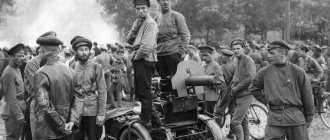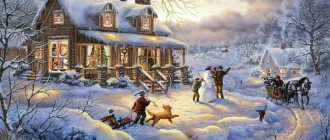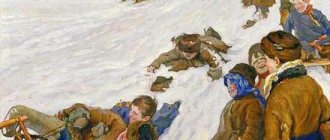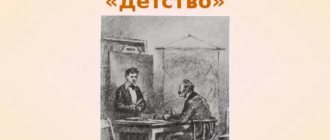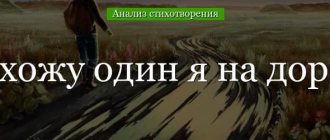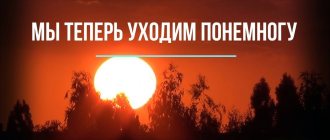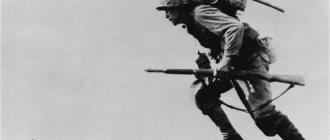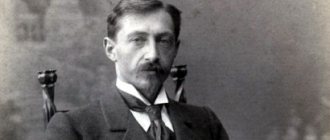The poem by Mikhail Yuryevich Lermontov, written in 1837, is based on real events that took place during the Patriotic War of 1812. The battle on the Raevsky battery, which later became the main grain of the novel “War and Peace” by Leo Nikolaevich Tolstoy, for the entire Russian people became an indicator of a great feat, the center of the clash of light and darkness. It is in this poem that the author presents the people as the main arbiter of history and sadly recalls past heroic events.
Special 1837th
1837 is a special year in the fate of Lermontov. It was this year that he wrote the poem “The Death of a Poet” on the death of Alexander Pushkin and became famous. At this time, Lermontov was immersed in thoughts about the past and present of the country, about the fate of the people in history and came to the conclusion that the mentality of the leaders of the 30s was unprincipled and weak-willed, devoid of heroism and courage. The famous critic Vissarion Belinsky felt well the main nerve of the text, seeing in Borodino a complaint “about the present generation, slumbering in inaction, envy of the great past, so full of glory and great deeds.”
battle of Borodino
The battle took place on August 26 (September 7), 1812, 125 kilometers from Moscow. This was the largest battle of the Patriotic War; about 130 thousand soldiers from each side took part in it. About 50 thousand people died on the battlefield.
It is believed that the Russian army won, but the next day an order was given to retreat in order to protect the army from a new enemy attack, which made it possible to save forces for subsequent battles. For the 100th anniversary of the battle, the artist Franz Roubaud, commissioned by Nicholas II, painted the panorama “Battle of Borodino”.
The Borodino paradox
Historians have always assessed the outcome of one of the bloodiest battles of the 19th century differently. The losses of both armies were enormous. Nowadays, the prevailing point of view in history is that the outcome of the Battle of Borodino remains uncertain. Napoleon himself believed that the Russians were defeated, and Mikhail Kutuzov, in turn, wrote to Emperor Alexander I: “We completely won the battlefield, and the enemy then retreated to the position in which he came to attack us.”
For supporters of the “French” victory in the battle, the main thing was that, firstly, many positions of the Russian army were (despite Kutuzov) in the hands of Napoleon, and secondly, that Moscow was eventually surrendered. Supporters of the opinion about the victorious significance of the Battle of Borodino for the Russians, in turn, recall that Napoleon did not fulfill his main goal: he could not defeat our army, and this strategically turned out to be a retreat-flight from Russia for him, and then defeat in the entire huge chain of Napoleonic wars.
Despite the fact that the Russians lost about 30 percent of their army as a result of the battle, the main mood of Lermontov’s poem is enthusiastic, the poet is proud of the heroes of 1812 and glorifies Russian weapons. This reflects the feelings of the Russian people, in whose minds the Battle of Borodino became one of the brightest and most famous pages of Russian history.
Summary
The folk ode, which begins with a speech by a young man and ends with the memory of his uncle, tells of a battle near Borodino in which a relative of the young man took part.
He speaks emotionally about the events of those years, expressing praise for his generation and words of indignation at modern society. He remembers the details of the battle, the fact that the commander told the army to retreat, and this led to the rage of the old warriors. Then it's time to fight the final battle.
The battle began with a skirmish that lasted several days to no avail, and ended with the inaction of the Russian troops. The uncle says that the French rejoiced at the retreat and defeat of the Russian army, but in the morning the colonel instilled confidence in the Russian soldiers, and they won the Battle of Borodino.
Second Borodino
“Borodino” is not the first poem written by Lermontov on the theme of the Patriotic War of 1812. The poet first addressed the events of the Battle of Borodino in 1830 in the poem “Borodin’s Field.” Seven years later, the poet returned to Borodin’s theme, significantly reworking the text. But it was from it that one of the central lines of the text of “Borodino” was taken: “Guys, isn’t Moscow behind us? / Let’s die near Moscow, / Like our brothers died!..” / And we kept the oath of allegiance / We went to the Battle of Borodino.”
Main characters
There are two characters in the film: an uncle and a young man who is the narrator. The first is an old soldier who visited the war of the twelfth year and tells how the Battle of Borodino took place. He is considered a veteran who saw and felt everything during the war.
The hero soberly assesses the events of those years, gives his assessment of what is happening, expresses pride in the Russians, and also expresses disappointment about modern society.
The young man acts as a young man who is interested in the fate and history of his Motherland, he is curious to know the details of the Patriotic War. Therefore, he comes to his uncle and asks him, as a participant in those years, what happened. He is aware of the Battle of Borodino, knows that all of Russia remembers it, and expresses hope that the younger generation will begin to follow the example of the veterans, will courageously stand up for the Fatherland at the right time and defend it.
This is interesting: researchers of the poem were able to find prototypes of the heroes. The young man is the author himself, and his uncle is the old soldier Andreev, who narrates the story. He was a non-commissioned officer of the Life Guards infantry, and Lermontov knew this man well.
They met in 1836, when Mikhail Yuryevich was painting in the studio. At that time, Andreev ordered his portrait in honor of the 25th anniversary of the battle. It was then that the writer met the participant and learned the details of his life.
Reproach and Praise
There are two key themes in the poem:
The first is the high significance of the feat of the Russian soldiers of 1812, admiration for the courage, unity of the people and fearlessness in the face of the enemy. Each participant in the battle understood that no one except him and his comrades could protect their country from a powerful enemy, which was then Napoleon Bonaparte and his army. “If it weren’t for God’s will, / They wouldn’t give up Moscow!” – the narrator exclaims on behalf of the entire people.
The second theme of the poem is a reproach to the generation of Lermontov’s own contemporaries - the people of the 30s: “The heroes are not you!” The narrator (and with him the author) idealizes the past and laments that today's generation has lost many high qualities. Echoes of the theme of opposition between generations can be found in many of Lermontov’s works. For example, in the famous “Duma”: “I look sadly at our generation! / Its future is either empty or dark, / Meanwhile, under the burden of knowledge and doubt, / It will grow old in inaction.”
Themes
Throughout the narrative from a participant in those years, one can trace the following themes:
- heroic heritage, patriotic spirit, which is characteristic of Russian people,
- heroism, issues of the past with the present, comparison of these two phenomena,
- regrets about the future society, that people are not heroes,
- people in the historical past and future of the country, their role at turning points in history,
- heroic leadership of the army commanders. For example, a colonel was described who, together with the soldiers, rushed into battle to defend the Fatherland. Thus, he inspired the soldiers.
The main themes of the work are criticism of the heroes of their time and the patriotism of the ordinary Russian person. These two themes can be seen both on the surface and between the lines.
Criticism of the heroes of their time
The famous critic Belinsky noted that a reproach to the renewed generation, which is unable to do something useful for society, is the main theme of the poem. The poet at one time criticizes contemporary personalities and compares the pathetic achievements of his generation with the achievements of the previous generation, but at the same time expresses the hope that a lesson from history will be learned.
Patriotism of an ordinary Russian person
Another important theme posed in the work is the theme of generation and patriotism. Lermontov, despite reproaches, praises the patriotism of the Russian man, his fortitude, courage and courage.
He says that the soldiers are silently angry at the actions of the commander of the army and are forced to obey orders, but are ready to go into battle and fight for a better future. But when the commander calls on people to defend the capital, they immediately go to their death in order to save their homeland and not give it to the enemy.
Therefore, Mikhail Yuryevich expresses the hope that as long as there are such desperate people, the country will not perish.
"Borodino" is a dialogue
In Lermontov's time, poems in the form of dialogue were very rare. The poet framed his work as a dialogue between a young man and his “uncle,” a former artilleryman who took part in the hostilities of 1812. All this is done to give maximum authenticity to the events. The Lermontov Encyclopedia says: “For the first time in Russian literature, a historical event was seen through the eyes of a common man, an ordinary participant in the battle, and the subjective assessment he gave to the event was shared by the author.” It is also important that in his story “uncle” always emphasizes the unity of the people: “And we promised to die, / And we kept the oath of allegiance / We went to the Battle of Borodino.”
main idea
Based on the theme and plot of Lermontov’s work “Borodino”, its compositional and artistic features, and the image of the presented veteran hero, one can identify the main thought and idea of the poem.
With his work, the author says that the merit of victory in that war is the courage, bravery and endless strength of ordinary people who united in the name of destroying the enemy. He says that this is not the work of politicians and generals, but the merit of ordinary peasants and hard workers.
Military words
Russia. Moscow region. Participants in the reconstruction of the Battle of Borodino during preparations for the celebration of Russia's victory in the Patriotic War of 1812. Photo ITAR-TASS/Andrey Lukin
“Borodino” is not as simple a poem as it might seem at first glance. Lermontov's text is populated with military terminology of the time.
Task for children: Test yourself!
For modern children, understanding a poem can be greatly complicated by a large number of obscure words. We offer you an oral game for better understanding and memorization of the poem.
Task 1: Guess the words from the poem based on their description:
- A tall headdress of a cylindrical or cone shape, with a visor and a chin strap, which existed in the Russian and foreign armies in the 19th - early 19th century. XX centuries ( Kiver )
- Military personnel who could operate both on horseback and on foot (Dragoons)
- A field fortification in the form of a square or polygon, surrounded by an earthen rampart and a ditch, intended for defense ( Redoubt)
- Steel blade, sword, dagger ( Bulat)
- The location of troops in the open air for recreation during hostilities ( Bivouac)
- Foreigner, enemy, ill-wisher, non-religious (Busurman)
- An artillery shell filled with bullets, iron, lead, etc. When fired, buckshot disperses widely, hitting the enemy ( Buckshot)
- A piercing weapon attached to the end of a military gun barrel (Bayonet)
- Military from light cavalry units, armed with pikes, sabers and pistols. A distinctive attribute of their form was a high quadrangular headdress (Uhlans)
- A machine on wheels on which the barrel of an artillery gun is mounted and secured ( Carriage)
- Military clothing for the upper body (Uniform)
Task 2: Now insert the missing words into the poem by M.Yu. Lermontov:
Borodino
Tell me, uncle, it’s not for nothing that Moscow, burned by fire, was given to the Frenchman? After all, there were fighting fights, Yes, they say, some more! No wonder all of Russia remembers Borodin Day! - Yes, there were people in our time, Not like the current tribe: Bogatyrs - not you! They had a bad lot: Few returned from the field... If it weren’t for God’s will, They wouldn’t have given up Moscow! We retreated in silence for a long time, It was annoying, we were waiting for a fight, The old men grumbled: “What are we doing? for winter apartments? Don’t the Alien commanders dare to tear _________ Oh, Russian bayonets?” And then we found a large field: There is somewhere to roam in the wild! Built _____
.
Our ears are on top! As soon as the morning illuminated the cannons and the blue tops of the forests - the French were right there. I hammered the charge into the gun tightly and thought: I’ll treat my friend! Wait a minute, brother monsieur! What is there to be cunning about, perhaps for a fight; Let's go and break the wall, Let's stand with our heads for our homeland! We were in a firefight for two days. What's the use of such a trifle? We waited for the third day. Speeches began to be heard everywhere: “It’s time to get to ______
!”
And then, on the field of the menacing battle, the shadow of the night fell. I lay down to take a nap at _______
, and until dawn I could hear how the Frenchman rejoiced.
But our open ______ was quiet: Who ______
cleaned the whole beaten one, Who
______
sharpened, grumbling angrily, Biting his long mustache.
And as soon as the sky lit up, Everything suddenly began to move noisily, The formation behind the formation sparkled. Our colonel was born with a grip: Servant to the king, father to the soldiers... Yes, I feel sorry for him: smitten by _______ , He sleeps in the damp ground. And he said, his eyes sparkling: “Guys! Isn't Moscow behind us? Let us die near Moscow, as our brothers died!” And we promised to die, And we kept the oath of allegiance in the Battle of Borodino. Well, it was a day! Through the flying smoke, the French moved like clouds, And everything towards our redoubt. _______ with colorful badges, _______ with ponytails, All flashed before us, All have been here. You will never see such battles!.. The banners were rushing like shadows, The fire was shining in the smoke, Damask steel was sounding, buckshot was screeching, The fighters’ hands were tired of stabbing, And the mountain of bloody bodies prevented the cannonballs from flying. The enemy learned a lot that day, What a daring Russian battle means, Our hand-to-hand combat!.. The earth shook - like our breasts, Horses and people mixed in a heap, And the volleys of thousands of guns Merged into a drawn-out howl... Then it got dark. Everyone was ready The next morning to start a new battle And stand until the end... Then the drums began to crack - And they retreated ________ . Then we began to count wounds, count comrades. Yes, there were people in our time, a mighty, dashing tribe: the heroes are not you. They had a bad lot: Few returned from the field. If it weren’t for God’s will, they wouldn’t give up Moscow!
A story about the initial stage of Lermontov's creativity
The poet's interest in Russian history. Motives for the creation and historical basis of the poem “Borodino”
Mikhail Lermontov was born into a noble family on October 15, 1814. He lost his mother early, who died at 22 from consumption, his father had almost no contact with him at the insistence of his grandmother, who raised her grandson on her Tarkhany estate. The boy was educated at home, with special attention paid to foreign languages, music and painting. Lermontov was interested in literary creativity from a very young age. At the age of 14 he was sent to the Moscow Noble Boarding School at the University, where after graduating from the boarding school he studied for two years. At the age of 18, he decided to become an officer and entered a military school in St. Petersburg. In 1834 he was assigned to a hussar regiment stationed in Tsarskoe Selo.
Since childhood, Lermontov was interested in the past of Russia. One of the most famous works on the topic of Russian history was the poem “Borodino”, written on the eve of the 25th anniversary of the Battle of Borodino. This largest fierce battle between the Russian and French armies, which took place on September 7, 1812, lasted more than 12 hours, from sunrise to sunset. At first, Napoleon's army managed to capture the positions of the Russian army during the fighting, but the Russians repulsed the attacks and forced the enemy to return to their original positions. Commander-in-Chief of the Russian Army Field Marshal M.I. Kutuzov intended to resume the battle and attack the enemy in the morning, but after reporting the scale of the losses, he gave the order to retreat.
The Battle of Borodino is considered one of the bloodiest one-day battles. Both sides lost about a third of their military personnel in killed and wounded: the Russian army was about 45-50 thousand people, the French - about 35 thousand. There were also large losses among the army leadership: 4 Russian generals were killed and 23 were wounded, in the Napoleonic army they were killed 12 generals, 38 generals and one marshal were injured. The general battle dispelled the myth of the invincibility of the “great” Napoleonic army. But neither the French nor the Russians admitted their defeat on the Borodino field. Napoleon failed to defeat the Russian army; Kutuzov, saving the army, was unable to defend Moscow. Nevertheless, morale rose in the Russian army, it managed to restore resources to expel the enemy, and the “great” army lost confidence in its own invincibility and lost heart. Captured Moscow became a trap for the invaders, from which a month later the flight of the French and their allies from Russia began.
Lermontov, born two years after these events, was aware of the Russian-French war from childhood from the stories of his grandmother’s younger brother and cousin, Afanasy Alekseevich Stolypin, a retired artillery officer who took part in the Battle of Borodino. The history of the largest battle became part of the poet’s family history. The memories of a relative played a significant role in the creation of poems about the war of 1812: “Two Giants”, “Borodin’s Field”. The idea for the poem “Borodino” originated with Mikhail back in 1832, when he was a student at Moscow University. This idea was embodied in 1837, when twenty-three-year-old Lermontov was already an officer. Soon he had to go into exile to the Caucasus, where he himself had the opportunity to participate in battles and prove himself to be a brave and fearless person. The poem "Borodino" became the poet's printed debut. It was published in the Sovremennik magazine in 1837 and immediately found recognition among readers.
Good to know!
Who are the dragoons?
The word dragoon appears in history for the first time in the 16th century: Marshal Brissac, during the occupation of Piedmont in 1550-1560, mounted selected, brave infantrymen on horses, gave this detachment the name Dragoons and used it for quick raids. However, these dragoons fought on foot.
The first commander who gave the dragoons their modern meaning was Gustav II Adolf. Dragoon regiments, properly organized, appeared in France under Louis XIV in 1668.
In Prussia, especially under Frederick the Great, dragoons often acted as heavy cavalry similar to cuirassiers. In Britain, the name “light dragoons” was synonymous with hussars. In the 19th century in Germany, Austria, France and England, about ⅓ of all cavalry consisted of dragoons, but in Italy there were none at all.
In the 20th century, due to the massive use of machine guns and other automatic firearms, actions according to the dragoon model became almost the only possible for cavalry.
| French dragoons (1806) |
Who is Ulan?
Lancers are, along with hussars, a type of lightly armed New European cavalry, armed with pikes, sabers and pistols. A distinctive attribute of their shape was a high quadrangular headdress.
| Lancers |
Samodelkin
